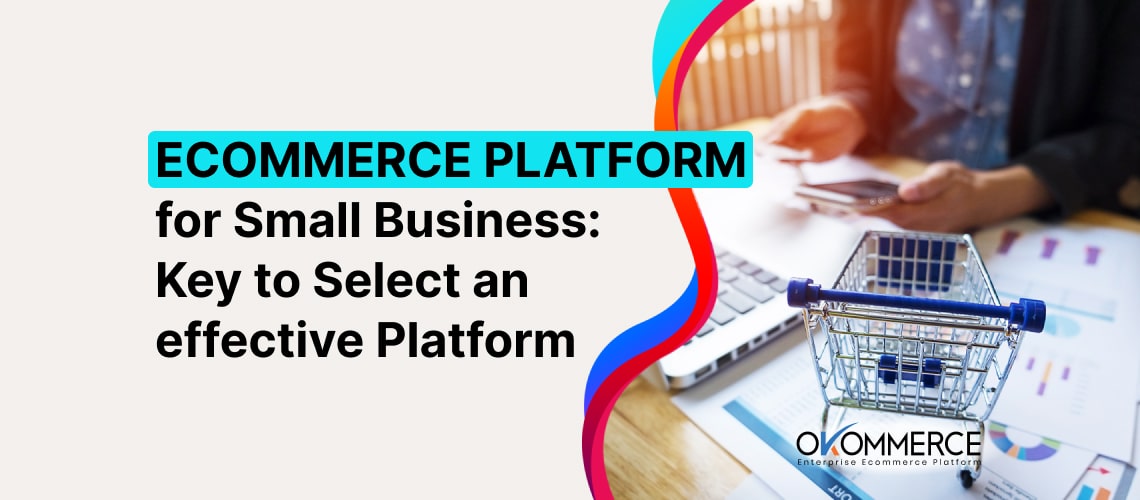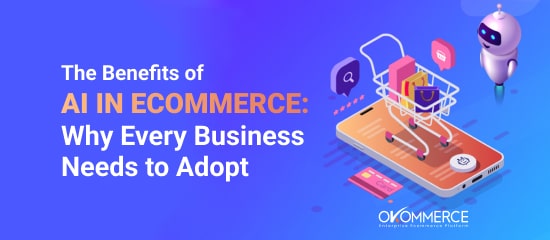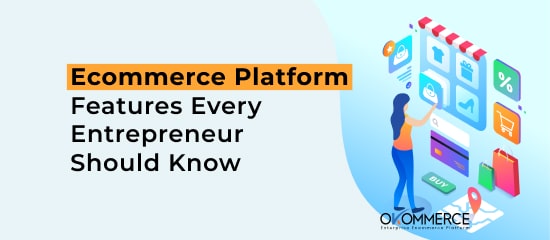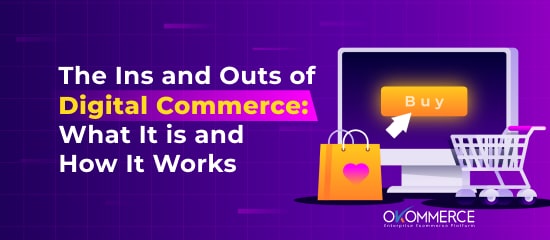Ecommerce Platform for Small Business: Key to Select an Effective Platform

What is The Meaning Of eCommerce in Small Business?

Ecommerce, short for electronic commerce, refers to the buying and selling of products and services online. In the context of small businesses, e-commerce can be a powerful tool for reaching a wider customer base and growing sales.
Ecommerce allows small businesses to set up an online store where customers can browse and purchase products or services from anywhere and at any time. This can help small businesses overcome the limitations of physical location and traditional store hours, and can also reduce overhead costs associated with operating a brick-and-mortar store.
Additionally, eCommerce platforms often offer tools and features for managing inventory, processing payments, and analyzing sales data, which can help small business owners streamline their operations and make data-driven decisions.
Overall, eCommerce can be a valuable strategy for small businesses looking to expand their reach, increase sales, and operate more efficiently.
How Has ECommerce Changed Small Business?

Ecommerce has revolutionized the way small businesses operate, providing new opportunities for growth and success. The most significant change brought about by e-commerce is the increased reach it offers to small businesses. With an online store, small businesses can expand their customer base beyond their physical location, making it easier to reach customers from all over the world. E-commerce has also lowered the barriers to entry for small businesses, enabling them to compete with larger companies on a more level playing field. Moreover, e-commerce has made it easier for small businesses to offer personalized shopping experiences to their customers, which can help build brand loyalty and drive sales. With the ability to process payments online and manage inventory more efficiently, eCommerce has also streamlined the operations of small businesses, allowing them to focus on other aspects of their business. Overall, eCommerce has changed small businesses in significant ways, providing new opportunities for growth and success.
Why Small Businesses Need an Ecommerce Platform

Small businesses need an ecommerce platform to take advantage of the growing trend of online shopping. Ecommerce platforms offer small businesses the opportunity to reach a wider audience and increase their customer base without the need for a physical storefront. By having an ecommerce platform, small businesses can sell their products or services online 24/7, making it more convenient for customers to shop at any time. Ecommerce platforms also offer a variety of tools and features that can help small businesses manage their inventory, process payments, and analyze sales data, which can help them make data-driven decisions to improve their business. With the growing number of customers shopping online, having an ecommerce platform is essential for small businesses looking to stay competitive in today's market.
Types of Ecommerce Platform
There are several types of ecommerce platforms available, each with its own set of features, benefits, and limitations. Here are some of the most common types of ecommerce platforms:
★ Hosted Ecommerce Platforms:
These platforms are fully hosted and managed by the provider and offer an all-in-one solution for businesses to create and manage their online stores. Examples of hosted ecommerce platforms include Shopify, BigCommerce, and Wix.
★ Self-Hosted Ecommerce Platforms:
These platforms require businesses to host and manage their ecommerce websites on their own servers. Self-hosted platforms offer more flexibility and customization options, but require technical expertise and can be more complex to set up and manage. Examples of self-hosted ecommerce platforms include Magento, WooCommerce, and OpenCart.
★ Marketplaces:
Marketplaces are online platforms that enable businesses to sell their products alongside other sellers on a single website. Examples of marketplaces include Amazon, eBay, and Etsy.
★ Enterprise Ecommerce Platforms:
These platforms are designed for large-scale businesses with complex ecommerce needs, such as multi-store setups, advanced inventory management, and extensive integrations. Examples of enterprise ecommerce platforms include SAP Commerce, Salesforce Commerce Cloud, and Oracle Commerce.
Key Considerations When Selecting an Effective Ecommerce Platform for Small Business
In today’s digital age, ecommerce platforms have become a necessity for small businesses. With the ability to reach customers around the globe, ecommerce platforms offer small businesses the opportunity to expand their customer base and increase revenue. Small business owners who are considering starting an ecommerce store have many options when it comes to choosing an ecommerce platform. With so many options available, it can be difficult to know where to start. In this blog, we will discuss some key considerations for small businesses when choosing the best ecommerce platform.
- Pricing
Pricing is often the first consideration for small businesses when choosing an ecommerce platform. There are various pricing models available, including monthly subscription fees, transaction fees, and pay-as-you-go plans. Small businesses should consider their budget and the expected revenue from their online store to choose a pricing model that fits their needs.
Some ecommerce platforms offer free plans, while others charge a monthly subscription fee. Free plans are a great option for small businesses that are just starting out or have a limited budget. However, free plans often come with limitations, such as a limited number of products or transaction fees.
- Ease of Use
Small businesses should choose an ecommerce platform that is easy to use and requires minimal technical knowledge. A platform that is difficult to use or requires technical expertise can be time-consuming and frustrating for small business owners.
Most ecommerce platforms offer drag-and-drop interfaces and pre-built templates that allow small businesses to quickly create an online store without any technical knowledge. Additionally, some platforms offer extensive documentation and customer support to help small businesses overcome technical challenges.
Transaction fees are charged by the ecommerce platform for each sale made through the platform. This fee can range from 1-3% of the transaction value, depending on the platform. Pay-as-you-go plans charge a fee per transaction, making it a good option for businesses with fluctuating sales volume.
- Customization
Small businesses should choose an ecommerce platform that allows them to customize their online store to reflect their brand identity. This includes choosing a platform that offers extensive design options, the ability to customize product pages, and a range of add-ons and integrations.
Most ecommerce platforms offer pre-built templates that can be customized to reflect the brand identity of the small business. However, some platforms offer limited design options, making it difficult for small businesses to create a unique online store.
- Payment Gateway Integration
Payment gateway integration is a critical consideration for small businesses when choosing an ecommerce platform. Payment gateways allow small businesses to accept payments online securely. Small businesses should choose a platform that offers multiple payment gateway options and supports the payment gateway that they prefer to use.
Most ecommerce platforms support popular payment gateways such as PayPal and Stripe. Some platforms also offer their own payment gateway, while others charge additional fees for payment gateway integration.
- SEO Features
Search engine optimization (SEO) is crucial for small businesses to rank higher in search engine results pages. Choosing an ecommerce platform that offers extensive SEO features can help small businesses improve their online visibility and attract more customers.
Most ecommerce platforms offer built-in SEO features such as customizable URLs, meta tags, and site maps. Some platforms also offer advanced SEO features such as keyword research tools and SEO analytics.
- Customer Support
Small businesses should choose an ecommerce platform that offers extensive customer support. This includes 24/7 support, phone support, email support, and live chat support. A platform that offers extensive customer support can help small businesses overcome technical challenges and ensure that their online store is running smoothly. Effective customer support requires a well-trained and responsive team that can provide personalized and helpful responses to customer inquiries, as well as resolve any issues promptly and efficiently. A robust knowledge base, FAQs, and self-help resources can also be valuable in empowering customers to resolve simple issues on their own. Good customer support can help build customer loyalty, improve brand reputation, and increase customer lifetime value, ultimately driving the success of an ecommerce platform.
- Scalability
Scalability is an important consideration for small businesses when choosing an ecommerce platform. Small businesses should choose a platform that can grow with their business and handle increased traffic and sales volume.
Some ecommerce platforms offer scalable plans that allow small businesses to upgrade their plan as their business grows. This includes the ability to add more products, increase bandwidth, and handle increased traffic.
A scalable ecommerce platform should be able to seamlessly handle increases in traffic and transactions without causing delays, crashes, or downtime. This requires a robust infrastructure with high-performance servers, flexible architecture, and efficient caching mechanisms. Scalability also involves the ability to easily add new features, modules, and integrations to the platform as the business expands. Ultimately, a scalable ecommerce platform is essential for ensuring a smooth, reliable, and successful shopping experience for customers, while enabling businesses to grow and thrive over time.
- Inventory Management
Inventory management is a crucial component of any ecommerce platform. It involves the tracking of inventory levels, orders, and stock movements to ensure that products are always available for sale. Ecommerce platforms offer a variety of inventory management tools, such as real-time inventory tracking, automatic stock updates, and the ability to set reorder points for products. By effectively managing inventory, ecommerce businesses can prevent stockouts, reduce excess inventory, and improve customer satisfaction. With the right inventory management tools in place, ecommerce businesses can streamline their operations, reduce costs, and optimize their supply chain.
- Transaction Fees
Transaction fees are a common occurrence in ecommerce platforms, and they refer to the cost associated with processing payments for a transaction between a buyer and seller. These fees can vary depending on the platform and payment method used, and typically, they are a percentage of the total transaction value. Ecommerce platforms charge these fees to cover the costs of payment processing, such as credit card fees, fraud prevention measures, and other operational expenses. While transaction fees can be an added cost for sellers, they provide a convenient and secure payment system for both buyers and sellers. Understanding transaction fees is an important aspect of selling on ecommerce platforms and can help sellers effectively price their products and manage their profit margins.
- Analytics
Analytics is a critical component of any ecommerce platform, as it provides valuable insights into customer behavior, sales trends, and website performance. Ecommerce analytics tools enable businesses to track and analyze key metrics such as page views, bounce rates, conversion rates, and customer demographics. With this information, businesses can make data-driven decisions to improve their online shopping experience, optimize their marketing campaigns, and increase their revenue. Analytics can also help businesses identify potential issues, such as cart abandonment or low conversion rates, and take proactive measures to address them. Overall, analytics plays a crucial role in helping ecommerce businesses understand their customers and improve their online presence to drive growth and success.
- Security
Security is a crucial aspect of any ecommerce platform, as it involves protecting sensitive customer information such as credit card details, personal data, and purchase history. An ecommerce platform should have robust security measures in place, such as SSL encryption, secure payment gateways, and two-factor authentication, to ensure that customer data is protected from unauthorized access, hacking, or fraud. Regular security audits, penetration testing, and vulnerability scans can also help identify and address potential security risks. Additionally, a secure ecommerce platform should comply with industry-standard security regulations, such as PCI DSS, GDPR, and CCPA, to ensure that customer data is handled responsibly and transparently. Overall, security is an essential component of an ecommerce platform that ensures customer trust, protects sensitive information, and safeguards the platform's reputation and success.
In conclusion, choosing an effective ecommerce platform for your small business requires careful consideration of your budget, ease of use, customization options, payment gateway integration, SEO features, mobile responsiveness, customer support, scalability, and security. By taking the time to research and compare different platforms, you can find the one that best fits your needs and helps you grow your business.
Okommerce for Ecommerce Business
Okommerce is a Dubai based cloud-based ecommerce platform that offers a range of features and tools to help businesses create and manage their online stores. It provides an intuitive interface, customizable templates, and flexible payment options to make it easy for businesses to set up and run their online stores. Additionally, Okommerce offers SEO optimization, marketing tools, and social media integrations to help businesses attract and engage with customers. The platform is also scalable and secure, offering robust infrastructure and encryption to protect sensitive customer data. Okommerce provides a range of pricing plans to suit different business sizes and needs, and its customer support team is available to provide assistance and guidance as needed. Overall, Okommerce is a reliable and effective ecommerce platform for small and large businesses that offers a range of features and tools to help ecommerce businesses succeed in the competitive world of online commerce. So If are from Dubai and looking for Ecommerce Platform in Dubai you can visit Okommerce.com or call at +97145968935




